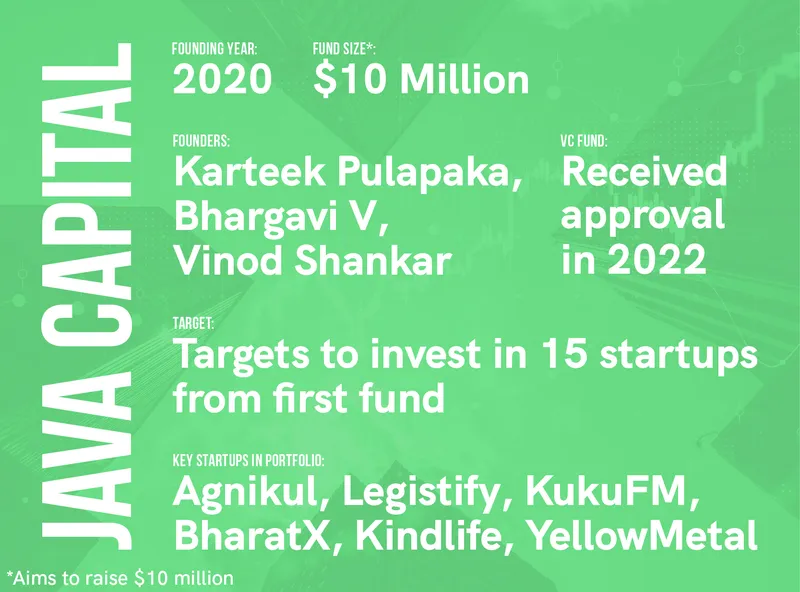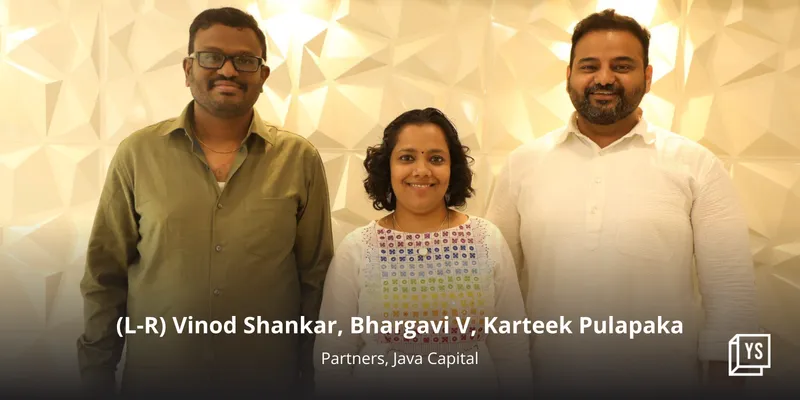Java Capital plans to catch the next big startup from Tier II cities
Micro VC fund Java Capital is focused on three segments of startup investment—SaaS, deeptech, and climate tech.
Jaipur, Surat, or Udupi might not be the first names that emerge when one talks about India’s startup hubs. However, Bengaluru-based micro venture capital fund Java Capital believes these Tier II cities could be home to the next big startup stories from the country.
, which received an alternate investment fund (AIF) licence in 2022, has made the conscious decision to invest in startups from the Tier II locations along with scouting for opportunities in typical startup hubs of Bengaluru, Mumbai, and the National Capital Region (NCR).
Founded by Karteek Pulapaka, Bhargavi V and Vinod Shankar, Java Capital aims to raise around $10 million in its first fund and has already garnered around 50% of the capital in its first close.

Java Capital started its operations in 2020 as an angel syndicate platform and has invested in over 23 startups.
On its radar are entrepreneurs from Tier II cities. “We have been cultivating this market for the last year as we believe this could be the next evolution for the Indian startup story as there are many hidden gems,” Pulapaka tells YourStory.
Java Capital has already opened a satellite office in Coimbatore and is looking at other locations such as Jaipur, Surat, and Udupi where it says there is strong entrepreneurial activity.
According to Pulapaka, Java Capital will be able to provide access to professional capital for entrepreneurs from these locations. It has already made an investment each in Jaipur and Coimbatore but the names were not disclosed.
The plan
The micro VC fund is largely focusing on three areas—SaaS (Software-as-a-Service)/ enterprise software, deeptech, and climate tech. According to Pulapaka, the SaaS category of startups is rapidly maturing in India while deeptech is emerging as a strong segment. While it is still early days for the climate tech segment, the potential remains strong.
“We do not have any doubt that climate tech is going to be very important in the next 7-10 years and as a country, we cannot ignore this space,” says Pulapaka.
Java Capital, which aims to close its first fund in the next six months, expects to back about 15 startups, with investments ranging from $150,000-250,000 for each company. It has already made four investments from the VC fund. Among the leading names in its startup portfolio include Agnikul, Legistify, KukuFM, BharatX, Kindlife and YellowMetal.
Pulapaka believes the focus of Java Capital on just three segments and on startup founders from just three locations gives the fund an edge.
Seed money
Given the founders’ experience, the primary focus of the VC fund is to back startups at the seed or pre-seed stages.

Pulapaka and Shankar have previously worked at Kalaari Capital, an early-stage VC fund while Bhargavi has been associated with VC firm GSF India. As engineers and finance professionals, the trio has also worked with large enterprises.
“We are very familiar with the very early stage startup investing landscape though it is the most challenging as we have to discover those companies,” Pulapaka says.
Despite a slowdown in startup funding, seed, and Series A funding has shown resilience. A report by Venture Intelligence on the Series A funding landscape noted that while 2022 witnessed 801 seed investments, down 7% from 858 deals recorded in 2021, early-stage funding was 35% above the average of 593 deals recorded in the recent seven years. Seed investments grew at a CAGR (compound annual growth rate) of 13% in the five year period from 2017 to 2022.
Pulapaka is also optimistic about the seed investment ecosystem in the country. He says the limited partners (LP) are still upbeat about making investments in the very early stages of startup and generally look at the current environment as more cyclical in nature.
“There is plenty of dry powder available while valuations have corrected to an extent,” he remarks.
This is also corroborated by the entrepreneurs’ side as there is no let-up in the number of startup proposals that Java Capital receives on an everyday basis. “We still get about 5-6 pitches every day and these are very serious entrepreneurs,” says Pulapaka.
The expectation in the ecosystem is that these startups will see a more favourable market condition when they seek a growth round of funding in the next 18-24 months.
Edited by Affirunisa Kankudti









